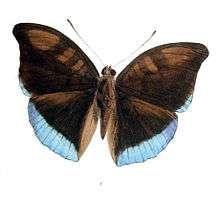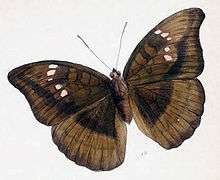Euthalia telchinia
| Blue Baron | |
|---|---|
 | |
 | |
| Scientific classification | |
| Kingdom: | Animalia |
| Phylum: | Arthropoda |
| Class: | Insecta |
| Order: | Lepidoptera |
| Family: | Nymphalidae |
| Genus: | Euthalia |
| Species: | E. telchinia |
| Binomial name | |
| Euthalia telchinia (Ménétriés, 1857) | |
The Blue Baron (Euthalia telchinia ) is a species of nymphalid butterfly found in South Asia and Southeast Asia.
Description
Forewing: costa strongly arched, not falcate below apex, which is slightly truncate; termen slightly concave, tornus rounded but very distinct, dorsum straight. Hindwing broadly pear-shaped, the costa, apex and termen roundly curved; tornus slightly produced; dorsum arched, slightly emarginate above tornus.
Male has the upperside dark velvety brown. Forewing: basal area, cell and wing beyond apex of latter crossed by broad, short, paler brown bars, and a pale brown pre-apical patch. Hindwing uniform. Forewings and hindwings with a brilliant metallic blue terminal band, commencing just above the tornus on the forewing and gradually widening to the tornus on the hindwing. Underside rich fuliginous brown, basal area below the cell of the forewing and basal area of the hindwing with loop-like black markings; cellular area of forewing crossed by five transverse, short, sinuous, black lines; both forewing and hindwing with broad, lunular, very obscure, dark discal broad and postdiscal narrow transverse bands.
The female resembles the female of Euthalia cocytus but apart from the difference in the shape of the forewing the ground colour on the upperside is a darker brown; there are five not four dingy white discal spots, the upper two and the lower two subequal; the inwardly oblique postdiscal dark band very diffuse and much broader. The underside is of a much paler ochraceous, but the markings are similar, Antennae, head, thorax and abdomen dark brown in both sexes; beneath in the male pale brownish, in the female ochraceous.[1]
References
- ↑ Bingham, C.T. (1905). The Fauna of British India, Including Ceylon and Burma Butterflies. 1 (1st ed.). London: Taylor and Francis, Ltd.